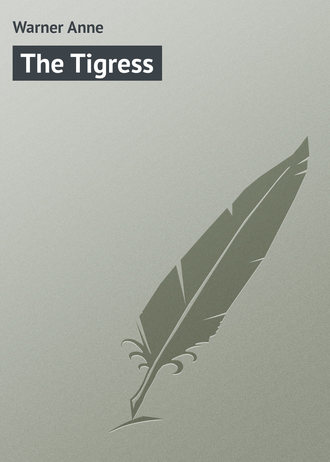
Warner Anne
The Tigress
CHAPTER I
On a Moonlight Night in Simla
"I do hope you are not going to weep!" said Nina.
She and he sat on a far-sheltered corner of the terrace in the gray shadow, and she had just told him that "everything was over."
As "everything" had been going on for the best part of three months, it was, perhaps, only natural that she should experience some concern as to how he meant to take it.
He was slow to reassure her, and she was impatient. "Because," she explained, "I never know just what to say or do when they weep. I'm never at a loss at other times; but – "
"Of course I shall not weep," he protested at length, with something of indignation in his tone. "Whatever gave you such an idea?"
"It isn't unusual," she explained. "Sometimes they storm. I've known them to swear most awfully. But when they are young, as you are, they so often just melt; and it is very trying, you know. Perhaps you'll swear. I'd much rather have it so. There was Emborough, for instance. He – "
"If you don't mind," he cut in, "I'd prefer not to hear."
"Ah, I see!" she exclaimed quickly. "You are neither going to weep nor storm. You are going to be just plain disagreeable. And if there is anything I hate it is a man who mopes."
He was thinking very hard, and for the moment he had failed to follow her. Disaster had dropped upon him like a bolt from the blue at the moment of his greatest confidence.
It was at Simla where, Kipling says, "all things begin and many come to an evil end;" and something, it seemed, had come to an end – evil or otherwise – as well as the season and the last of the dances at Viceregal Lodge.
Ten minutes ago he had been so convinced that the end was to be "otherwise" that even now he couldn't believe it was to be evil.
"Why," he managed to say after a brief pause, "I don't understand you at all. I – "
"No one ever has understood me," she assured him. "Even when I've gone to the trouble of explaining they manage somehow to get the explanation all upside down. It's very tiresome – very."
"I really thought you loved me! You – "
"They all think I love them. That's the odd part of it. I'm sure I never told any one. And yet they are so conceited – Oh, why can't you men appreciate being petted and amused, without imagining that it must be inspired by adoration and coupled with a desire for life-long attachment?"
"You promised to bolt with me," he asserted boldly.
Nina's chair jumped back three inches, impelled by the reflexes of a slim but sturdy pair of long legs. Hers, not the chair's.
"I abominate a liar!" she announced firmly.
"So do I," he came back. "You did promise me. It was during that last waltz."
"I am never responsible for what I say when waltzing."
"You admit it, then?"
"I admit nothing. I neither confirm nor deny. I don't know."
"But we came out here to arrange it. Or don't you remember that, either?"
"I fancied it was because you wished to smoke."
"God!" he exclaimed suddenly. "How can you be so bitterly cruel!"
She may have been a reincarnated tigress – in after years there was a man who always declared so – and then again she may not. It is quite possible that circumstance and environment made her what she was.
Certainly at heart Nina Darling was not a bad woman. There were times when she tried very hard to be a very good woman according to her lights. And yet, somehow, somewhere within her she seemed to possess a faculty for making men wretched.
The world – or a very large part of it – regarded it as an insatiable craving, an unappeasable appetite – a sort of lust for personal aggrandizement, growing out of personal vanity. But then the world knew nothing of Nina Darling's secret – which made all the difference.
For right judgment a few facts will not serve. Unless we have them all we are likely to fall into error. To argue from effect back to cause is a very risky undertaking. And that was what most people did in Nina Darling's case.
Young Gerald Andrews, of the civil service, the most recent victim, whom she had had in leading strings ever since he came to Simla, fancied her from the very first the most beautiful creature he had ever seen.
Now, stung by the lash of her scorn, the sheer fact of her unattainableness seemed to redouble her charm.
There was something wraithlike about her. She appeared to hold kinship with the moonlight, which in its loveliness overspread lawns and flowerbeds near at hand and turned to opal the mists that hung and swayed over the valley beneath them, where the lovely Annandale roses were blowing.
Until now he had always thought that her big eyes were violet-blue. But suddenly he saw opal lights in them and opal flame. And her gown was not white and silver, as he had fancied, but spun of moonbeams and studded with opals.
Her long, sinuous figure, more revealed than hidden by its gauzy investure, suggested to him Lilith, and the medieval conception of an angel as well.
He hardly expected an answer to the exclamatory question wrung from him by the torture of her words, but she had it ready.
"Because I eminently prefer my matrimonial frying-pan to the blistering coals of the illicit," she said coolly.
The boy – for he was scarcely more, big and handsome and strong though he appeared – looked terribly wobegone. But on the comparison floated a straw, and like the proverbial drowning man, he clutched at it.
"You admit it's a frying-pan," he reminded her.
"Sizzling hot," she told him. "I'm scorched through and through. My heart's a cinder."
The straw went under, carrying him with it, but he still clung on. "Let me take you out of it," he pleaded desperately.
But her shapely shoulders rose in a discouraging shrug.
"Into the fire?" she asked calmly.
"Into Elysium."
She laughed at that. "Worse," she said with a touch of cynicism. "The home of the blessed dead! I'm not blessed and I'm not dead – and I don't want to be!"
"You know I didn't mean that," he objected.
"The only other Elysium I know is Elysium Hill, with its doleful deodars. A most distressing – "
Young Andrews interrupted her by springing up. "Oh, don't be so frightfully literal!" he cried, annoyed to a point of misery. "You know very well what I meant."
"If you're going to be rude – " she began threateningly. And on the instant he was in his chair again, leaning forward, groping for her bare hand.
"No, you mustn't!" she warned, drawing both hands out of reach. "You'll only declare that I encouraged you."
At that he gasped audibly. "Encouraged me!" he exclaimed when he breathed normally again. "Aren't you a little late with your caution? I suppose I never have been encouraged."
"There! I knew you'd say it."
"Well, I've held your hands dozens of times, haven't I? More than that, I've held you in my arms, and I've kissed your lips and your eyes and your hair. Isn't that encouragement?"
She smiled calmly and whimsically.
"Yes. Encouragement for me. I couldn't resist you."
"Your heart isn't a cinder at all," he growled, frowning. "It's a stone! How many other men have you treated like this?"
"None," she answered boldly. "I never treat two alike. I have too much imagination for that. There are always variations."
His voice was very bitter as he said: "You'll meet your match some day. I hope to God you will!"
"I've met him already," she returned. "He's the only man I care a straw about."
"Your husband?" he hazarded.
"Good Heavens! No! Poor Darling! He doesn't deserve the life I lead him. I'm charitable enough to wish him a better fate."
"What happened to your match then?"
"Now you are asking riddles," she said. "That question has never been satisfactorily answered."
"You mean you don't wish to tell me, I suppose."
"I'd give anything in the world if I could. He was reported dead eight years ago, but – "
"He isn't?"
"He wasn't then."
"How do you know?"
"He was heard from after."
"Then he's alive still – you know that much?"
"No," she replied languorously. "I don't know that much. He may have died since, don't you see?"
"Let me find out for you," he proposed abruptly. "I'll – "
"You're very kind, but you'd have your trouble for your pains. He doesn't want to be found, wherever he is, dead or alive, and I'll back him against the world when it comes to having his own way."
She shivered slightly and drew the filmy scarf closer over her bare shoulders. "Besides," she added, "when the message was sent he was starting for 'the world's end,' and 'the world's end' is a big place to find a man. The needle and the hayrick are child's play to it."
"I'm terribly interested," said young Andrews. "I am really. I didn't believe you'd admit any chap was your match. Do you mind telling me what he was like?"
"He was more than my match," she confessed. "He was something else, and that is why no other man ever will be able to please me after his newness has worn off."
"As mine has?"
"As yours has."
"Gad! But you're frank, Nina."
"I know it. It's my one admirable quality. I'm tired of you, Gerald. I always get tired in the same place."
"The same place?" he repeated, puzzled.
"When they're not satisfied with a day and want to make it forever. The mere thought of forever wearies me. I feel like killing a man when he so much as hints at it."
"You haven't killed your husband," he reminded her.
"Ah, but how I have been tempted!" she laughed. "Some day I may."
"I know something of what a beast Darling is," he ventured. "I've heard it at the club. They say – "
"Don't!" she begged. "I won't listen. It may all be true, but I'd rather not hear it. I'm sorry for him. I'd only kill him to put him out of his misery – to put us both out of our misery."
"Of course you don't mean that. You shouldn't say it."
She didn't contradict him, and for a little there was silence between them. His thoughts reverted to the man who was her match – and more.
"And the other man?" he queried. "You said he was something else. What else?"
"My mate," she said simply. And again the silence fell.
Presently her laugh rang out, clear and bell-like, startling her companion from gloomy reverie. It jarred awfully. It was like dance music at a funeral.
"I can fancy what else you've heard at the club," she began, the opal lights in her eyes suddenly blazing. "They say I'm an angel, don't they?"
"They wouldn't dare say anything else in my presence."
"To be sure" – bitterly – "that's condemnation enough in itself. Before you they pronounced me a good and virtuous wife, I suppose. And behind your back – Good Heavens, what must they not say behind your back!"
"You are good and virtuous," he defended with boyish loyalty.
"Of course I am," she agreed. "I've driven one man to drink by marrying him, and more than I can count by not. I'm an angel, truly. But it's so hard to tell just what to do. I am my brother's keeper, and yet I go through life adding each year to the army of the besotted."
It was not at all the trend that young Andrews had foreseen in bringing Nina Darling to this shadowy corner of the terrace. Every fresh lead made the situation more uncomfortable. He had been brimming over with passion and sentiment, and here they had strayed away into a field rife with some of life's hardest facts.
"Promise me," she begged, "that you won't desert the civil service for the army – this army, my army!"
"God knows what I shall do, Nina!" he flung back desperately. "I banked everything on you. I didn't think you'd fail me."
"I've failed every one that ever came into my life," was her candid rejoinder. "Every time I crave and take a little passing pleasure some one suffers, and I haven't a drop of vicious blood in my veins. I believe I was cursed in my cradle."
He started to protest, but she shook her golden head dispiritedly. The blues – rare visitors – had settled down upon her.
"If I had only met you first!" he cried. "If you had married me I would have saved you."
"Don't!" she supplicated. "Please, please don't! I hate the word – marriage. Who was it said: 'Love is a soufflé that marriage changes to a bread-and-butter pudding?' I've seen it borne out scores of times. Soggy, indigestible stuff, without spice or flavor."
The melody of the dance music which all along had seeped to them in harmonic murmur from the distant ballroom was now hushed.
In the distance, at the opposite end of the terrace, figures – single and grouped – moved in silhouette across the glare from the lighted windows. Along the garden paths there passed at intervals sentinel Ghurkas from the viceroy's guard of honor.
Young Andrews's thoughts were long, long thoughts. He was sorry for the woman, but he was still more sorry for himself. He had turned a little away from her. His head was bowed, and his gaze was lowered to the pavement at his feet.
Nina had risen before he was conscious of her movement. Then belatedly he sprang up.
"It is late," she said. "The Ramsays are probably looking everywhere for me. I mustn't keep them waiting."
But he scarcely heeded. He stepped very close to her and gripped her by either arm.
"Tell me," he begged, low-voiced, earnest, "is there nothing in your heart for me?"
"Oh, yes!" she answered quite casually. "Sympathy – oh, ever so much sympathy!"
"And there can never be anything else?"
"There never can be anything else – except – "
She paused, and his hopes fluttered.
"Except – " he repeated.
"Gratitude. I am grateful. I was so afraid you were going to weep. And you didn't."
CHAPTER II
A Psychological Contretemps
Young Andrews was a sensitive soul, but he was not unmanly. He fought off the tears as long as he was conscious, but his pillow was wet in the morning.
His station was "on the Bombay side," as they say in India. To be exact, it was at Junnar. And he started down the next day, after sending Nina a bouquet of Annandale's loveliest roses. But when he alighted from the little branch railway line at Umballa, he halted.
The cantonment here was the home of the Darlings. But it was also the home of Dinghal, a deputy commissioner, who was a friend of young Andrews. So young Andrews lingered, and the deputy commissioner made him welcome.
Hitherto he had regarded Dinghal as rather a bore. And in this he was thoroughly justified. But since his two months at Simla the deputy commissioner had acquired for him a distinct interest.
Dinghal knew the Darlings intimately, and his passion for gathering and disseminating minor gossip, which had once been a fault, became now, in the changed tastes of his visitor, an enviable virtue, especially as the visitor found it the easiest thing in the world to direct the flow into the one desired channel.
As a rule there was nothing vicious about Dinghal's gossip. It was so pitifully tame and pointless that it wearied the listener to extinction; for Dinghal was a kindly man, inclined to gloss over faults and failings and to "play up" the good points of even the most unworthy.
This was another reason why young Andrews was so vastly entertained by all the little talks they had about Colonel and Mrs. Darling. He had heard enough of the other sort of thing in the club at Simla, and had relished it then, in that Nina's husband was the chief victim, and at that time his sympathies were all with Nina.
What he craved most now was unbiased truth. Which is sometimes a panacea – and sometimes not.
"They're not happy, to be sure," Dinghal admitted with evident reluctance. "But I don't know that either is to blame. Just a case of mutual inadaptability that neither discovered until it was too late. I knew Darling long before he married her, and I know people who knew little Nina Calthrop when she was crowing in swaddling clothes.
"There's not a better family in England. Good people all of them. The men have rather run to the army. You know how that goes in families. She's a grand-daughter of old General Buddicomb, who distinguished himself in Egypt in 1882.
"The general's sister, Nina's great-aunt, married the Duke of Pemberwell. Fine people, I tell you. Then there was Kneedrock; a husky young giant – viscount, you know – son of the Earl of Dumphreys, who went to South Africa and never came back."
"Never came back?" echoed young Andrews questioningly.
"Reported killed at Spion Kop, I think it was. Body never brought home, though. May have been Bloemfontein, I'm not sure. At any rate, they say he was Nina's favorite cousin. She certainly took his loss very keenly.
"After her first wild grief she developed a mania for particulars. When peace was arranged and the rank and file were coming home by the shipload she lost no chance of getting every fact she could from every officer she met.
"At the Pemberwell seat – Puddleford – she encountered Colonel Darling. It was he, they say, who identified poor Kneedrock's remains, what there was of them, and, of course, he held for her at that vital moment more interest than any other man, woman, or child in the United Kingdom.
"She annexed him – body, soul, and breeches, as the saying is. And it wasn't Darling's fault that he was flattered and fascinated, for Nina was then barely twenty, and the rarest, flowerlike slip of a girl you can imagine.
"You know what she is now. Beautiful, you think, eh? Everybody agrees that Nina is beautiful; and she is. But five years in India, and – well, let us say, the life of the mismated – haven't failed to rub some of the bloom off the peach."
Mixed metaphors had no terrors for Dinghal, who evidently inherited from somewhere a strain of Irish blood, despite his name, and treated "bulls" as if they were pets.
"Was this fellow, Kneedrock, ever heard of afterward?" his listener questioned. "Reported alive, I mean. It seems to me – "
"Oh, yes," Dinghal answered. "Every now and then a story crops up from somewhere that he's been seen. But nobody believes it. If he's alive there's no reason why he shouldn't go home, is there? The whole thing is ridiculous on its face. Besides Darling saw him. Says he was practically shot to pieces."
"I thought I'd heard it," returned young Andrews casually. And to himself he said: "Kneedrock is the man she meant. Her cousin, her match, and her mate – all in one."
"Yes," Dinghal went on, calmly filling his pipe, "Nina Calthrop was something to covet; and, naturally enough, Darling coveted her.
"Then, on her side, there was gratitude, for the colonel had given her a world of the sort of detail she wanted. She had cross-examined him like a K. C., and he had answered fully and freely out of the overflowing storehouse of his experience.
"If they could have gone on talking forever about that battle – I believe now it was Spion Kop – they might have been happy yet. But in time she pumped the cistern dry. There wasn't a crumb of fact or conjecture left in Darling's larder that hadn't been rolled over and over and stripped to its bare bones."
Young Andrews nearly howled. The mixture of figures was really superb.
"I fancy the pumping was pretty well finished before the wedding," the recital continued; "but I'm not stating that as a fact. You see that was quite six months after their meeting, and two years or more after Kneedrock's taking off. And in that six months they had seen each other, not continuously, but at intervals, for Darling was a very busy man.
"Their honeymoon, such as it was, was spent on a P. & O. steamer. I have been told that they each discovered their wretched mistake before they got to the Gulf of Aden. Take it for what it's worth.
"Conditions weren't all they might have been when they reached Umballa. That is certain. Darling did his best to hide the rift in the lute; but Nina never seemed to care a hang what people thought or said.
"Mind you, I'm not blaming her. I like the frankness of it. Not that she complained or whimpered. Not she. But she just went wild. Flirted like the very devil with anything and everything that came along.
"That was five years ago, mind you; and she hasn't mended her ways since. There are some who say she is possessed of the seven devils that the Lord cast out of Mary of Magdala, but – "
"It's a lie!" broke in young Andrews furiously. "She's – "
"Of course," Dinghal came back heartily. "I know that. She's not a bad woman. But I've heard her painted blacker than the Black Knight of the Black Lands.
"There is no question that more than one young fellow has gone straight to perdition because of her – and some old fellows, too, for that matter. But they were weaker sisters, who hadn't wit enough to save their skins from Hades."
His listener writhed. The deputy commissioner's rhetoric was certainly most trying.
"I don't suppose," he pursued, "that in the history of the world there has ever been a married pair more lied about than the Darlings. Nothing has been too bad for the victims of her charms to say about her; and for years the gossips from here to Singapore have been telling wild tales of the colonel's cruelty, wreaked in vengeance on his wayward mem-sahib.
"They've had her drawn and quartered, cut, bruised, and dislocated. To believe the hundredth part of these stories she must, long ere this, if she managed to survive, have been resolved into a more helpless, unsightly cripple than the most distorted Sadhu that makes hideous the twice-yearly festivals at Tirupankundram. Yet I know there's not a scintilla of truth in any one of them."
"I heard something of that sort at Simla," said Andrews, frowning.
"You can hear it anywhere. Whenever conversation flags in Anglo-India some ass or knave will introduce the Darlings, and rehearse the latest invention of the prolific and never-failing scandal-makers."
"But he's cruel to her, isn't he?"
"He's only cruel to himself," answered Dinghal. "He's killing his body and soul with strong drink, and he's risking his temporal and eternal future as an officer in his majesty's service and as a Christian gentleman.
"I give you my word, Andrews, he's never spoken a harsh word to her nor laid a heavy hand on her fair person. And yet he suffers the torments of the damned because of her. It's a very painful situation."
Andrews said he didn't pretend to understand the thing, and would like to have the key.
Dinghal hesitated a moment. Then he looked very impressive, and when he spoke it was with lowered voice.
"I can give you the key in three words," he said.
He paused again, and Andrews waited.
"It is this," Dinghal divulged gravely: "He loves her."
The young man from the Bombay side was thoughtfully silent for a space. Then, as the revelation sank in, he murmured, half to himself and out of the abundance of his own recent experience:
"God pity him!"
"That's what I say," agreed Dinghal.
At the time of this conversation Andrews had not seen Darling. He met him a night or two later at the Umballa Club, and a strange emotional mix-up resulted. The young man's sentimental side was oddly stirred. Darling appealed not only to his sympathy, but to his admiration.
It was true that he had been prepared for something of this kind by Dinghal; but he never suspected that he could entertain more than a sort of passive pity for Nina's husband. He had an innate dislike for weak men, physically and morally.
In that respect – and in that only – Andrews was to a degree feminine. Strength appealed to him as it appeals to women. And the fact that Darling had given way to a dulling, deadening indulgence in alcoholic excesses argued for a sort of moral cowardice.
But when he met the colonel he was surprised. It may have been that he pictured him in advance as habitually maudlin, or sodden or morose. Certainly he was no one of these. He had the look of a hard drinker, it was true; but he carried his liquor well. More than that, he gave the unmistakable impression of inherent strength and courage.
Darling was not a large man. He appeared to measure barely five feet nine, and his weight could not have exceeded ten stone – apparently all bone and sinew, with no sign of bloating.
Sandy-haired, pale blue of eye, his firm chin a trifle long, he was not ill-looking. But his age must have doubled Nina's on their wedding day.
Before he and Andrews had chatted for five minutes a mutual liking was established. They were both passionately fond of sport, and the fact developed and was exchanged in that brief period of intercourse.
"If you've nothing better to do to-morrow," Darling suggested, "I'd be glad to show you some of my trophies. What do you say to tiffin with me? My wife is still in the hills, and we can talk big game without fear of boring the other sex. Shall I expect you?"
Andrews knew that he should say he had met Mrs. Darling at Simla, but he was so eager to answer "yes" that the opportunity got away from him at the moment; and as it didn't again present itself, his failure to make the truth clear was a harassing worry from that time on.
Moreover, though he could not repent, he reproached and upbraided himself for having fallen in love with Nina. All that he had learned since arriving at Umballa appeared only to add to her desirability. Absence had indeed, in this instance, made the heart grow fonder.
That he had broken his journey here, not so much for the sake of pumping Dinghal as for the chance of getting one more look at her – possibly one more word with her – he had candidly to admit to his better self. But he wished with all his heart that she was maid or widow, or – if there must be a husband, that he was some other – almost any other than Darling. He would have felt less a brute had it even been Dinghal.
It was a psychological contretemps of the rarest sort, and distinctly uncomfortable. He had found the colonel as infatuating in his way as his wife was in hers, and, naturally, there were no means by which he could reconcile the liking and the loving.
Even when he appeared at the Darling bungalow, the next day, the thing got him by the throat, as it were, at every turn. For the trophies of the sportsman and the all-too-feminine evidences of the chatelaine clashed side by side; every clash echoing in young Andrews's soul.
Again and again he found his attention straying, for instance, from an especially fine tiger-skin or the mounted head of a curiously horned markhor to a dainty writing-desk that he knew at a glance must be Nina's, or to a framed photograph of a group on an English lawn, in which, instinctively, he detected Nina in the tall, girlish figure in the white frock.
Indeed, the drawing-room seemed to be all Nina. He saw her everywhere – in every chair, on every window-seat, and on every couch. The dining-room was more divided; but the gun-room, of course, was all Darling.
They lingered there the greater part of the afternoon. Every rifle, every fowling-piece had its story, and there were many of them; for Darling boasted a veritable armory.
It was here, too, that Andrews got some comprehension of the extent of the officer's unbridled indulgence. He drank and smoked practically continuously. One peg followed another with but the briefest intermissions; and the civil-service man made no attempt to keep pace with him.
If any effect was observable it was merely in a readier flow of narrative, in a more extended and richer vocabulary. But, strangely enough, from first to last, there was no mention of Mrs. Darling. And his visitor, taking this in the nature of a warning, knowing what he did, deemed it not only wiser but safer, now, to guard the fact of his acquaintanceship.
In his closer study of Darling he had made a discovery which accounted, he believed, in a measure, at least, for his strange appeal. Even in his gayest moments there was a certain pathos in his expression.
Andrews had noted this the previous evening at the club, but had failed to trace it. He found it now in a very perceptible droop, at intervals, of the corners of his mouth. And it was as though he knew this and struggled to avoid it which gave the impression of bearing up against odds that were too great for him.
The afternoon was well spent before Darling would listen to his guest's going. They were still in the gun-room when, at length, he rose for departure. And then the colonel delayed it further by a proposal that he consider joining Major Cumnock and himself on a hunting trip they were planning.
"I'd love to, of all things," Andrews returned heartily. "But the fact is my leave ends in another week, and I've got to report at Junnar by the twenty-fifth. Otherwise, I shouldn't hesitate a second. I – "
And there he suddenly paused.
It was something in Darling's expression that arrested him first; something that he couldn't just interpret. Afterward he told himself that it was a most singular combination of rapture and pain.
Then he, too, caught the echo of voices – women's voices – and, the next instant, one woman's voice rose clear above the chorus. It was Nina's.







